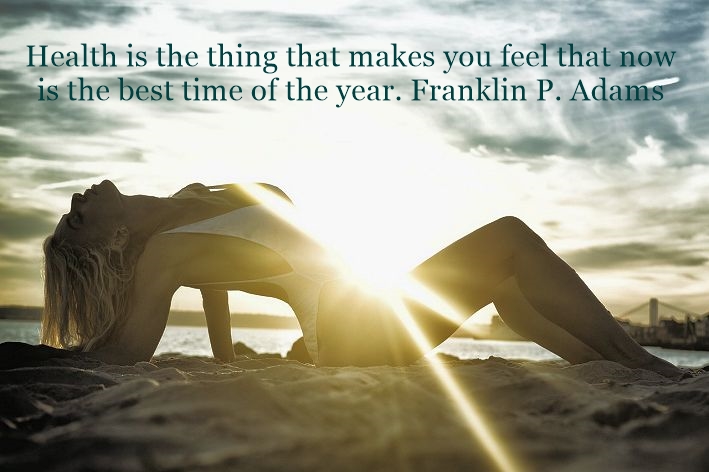
Health & wellness, a page that describes the different aspects of wellness and health, with quotes and links to specific resources and news on the matter.
Health is the thing that makes you feel that now is the best time of the year.
Franklin P. Adams (1881-1960, American journalist, humorist)
Health is the greatest of all possessions; a pale cobbler is better than a sick king.
Isaac Bickerstaffe
In 2015, the population of the United States (U.S.) spent an estimated $3.2 trillion on healthcare costs. However, despite this expenditure, a study by the U.S. National Research Council, published in 2013, showed that Americans die at a younger age and experience more illness and injury than people in other developed countries.
Internet news
The concept of total wellness recognizes that our every thought, word, and behavior affects our greater health and well-being. And we, in turn, are affected not only emotionally but also physically and spiritually.
Greg Anderson
As a remedy against all ills; poverty, sickness, and melancholy only one thing is absolutely necessary; a liking for work.
Charles Baudelaire (1821-1867, French poet)
The health of the people is really the foundation upon which all their happiness and all their powers as a state depend.
Benjamin Disraeli (1804-1881, British statesman, Prime Minister)
The human body has been designed to resist an infinite number of changes and attacks brought about by its environment. The secret of good health lies in successful adjustment to changing stresses on the body.
Harry J. Johnson (American medical doctor)
Man needs difficulties; they are necessary for health.
Carl Jung
No time for your health today, will result in no health for your time tomorrow.
Irish Proverb (Sayings of Irish origin)
Measure your health by your sympathy with morning and spring. If there is no response in you to the awakening of nature – if the prospect of an early morning walk does not banish sleep, if the warble of the first bluebird does not thrill you – know that the morning and spring of your life are past. Thus may you feel your pulse.
Henry David Thoreau (1817-1862, American essayist, poet, naturalist)
Health is a great treasure. It is the richest possession mortals can have. Wealth, honor, or learning is dearly purchased, if it be at the loss of the vigor of health. None of these attainments can secure happiness, if health is wanting.
Ellen Gould White
What is health and how to keep it in a good balance.
The word “health” refers to a state of complete emotional and physical well-being. Healthcare exists to help people maintain this optimal state of health. Good health is central to handling stress and living a long and active life. In 1948, the World Health Organization (WHO) defined health with a phrase that is still used today. “Health is a state of complete physical, mental and social well-being and not merely the absence of disease or infirmity.” WHO, 1948. In 1986, the WHO further clarified that health is: “A resource for everyday life, not the objective of living. Health is a positive concept emphasizing social and personal resources, as well as physical capacities.”

Health can be defined as physical, mental, and social wellbeing, and as a resource for living a full life. It refers not only to the absence of disease, but the ability to recover and bounce back from illness and other problems. Factors for good health include genetics, the environment, relationships, and education. A healthful diet, exercise, screening for diseases, and coping strategies can all enhance a person’s health. This means that health is a resource to support an individual’s function in wider society. A healthful lifestyle provides the means to lead a full life. Nowadays health can also be considered as the ability of a body to adapt to new threats and infirmities, and that means to be aware that modern science has increased human knowledge of diseases and how they work.
Physical wellbeing involves pursuing a healthful lifestyle to decrease the risk of disease. Maintaining physical fitness, for example, can protect and develop the endurance of a person’s breathing and heart function, muscular strength, flexibility, and body composition. Physical health and well-being also help reduce the risk of an injury or health issue. Examples include minimizing hazards in the workplace, practicing safe sex, practicing good hygiene, or avoiding the use of tobacco, alcohol, or illegal drugs.
Mental health refers to a person’s emotional, social, and psychological wellbeing. It is as important as physical health to a full, active lifestyle. It is not only the absence of depression, anxiety, or another disorder, but it also depends on the ability to enjoy life, bounce back after difficult experiences, achieve balance, adapt to adversity, feel safe and secure, achieve your potential.
Physical and mental health are obviously linked. If chronic illness affects a person’s ability to complete their regular tasks, this may lead to depression and stress, for example, due to money problems. It is important to approach “health” as a whole, that is through a holistic approach.
Health should be a good investment, not a bad expenditure.
Carl William Brown
Health depends on a wide range of factors. People are born with a different mixed range of genes, and in some of them, an unusual genetic pattern can lead to a weak level of health. Environmental factors then play a role. Sometimes the environment alone is enough to impact health. Other times, an environmental trigger can cause illness in a person who is genetically susceptible.
Access to healthcare plays a role, but the WHO suggests that the following factors may have a bigger impact on health than this: where a person lives, the state of the surrounding environment, genetics, income, education level, relationships with friends and family. The social and economic environment, including how wealthy a family or community is; the physical environment, including parasites that exist in an area, or pollution levels; the person’s characteristics and behaviors, including the genes that a person is born with and their lifestyle choices, all these factors can clearly influence in a good or bad manner our health.
Maintaining wellness and an optimal health should be a lifelong, daily commitment. Steps that can help us maximize our health include: a balanced, nutritious diet, sourced as naturally as possible, regular exercising, screening for diseases that may present a risk, learning to manage stress, engaging in activities that provide purpose and connection to others, maintaining a positive outlook and appreciating what you have, defining a value system, and putting it into action. Peak health will be different for each person, and how you achieve wellness may be different from how someone else does. It may not be possible to avoid disease completely, but doing as much as we can to develop resilience and prepare the body and mind to deal with problems as they arise is a step we can all take.
You can also visit:


